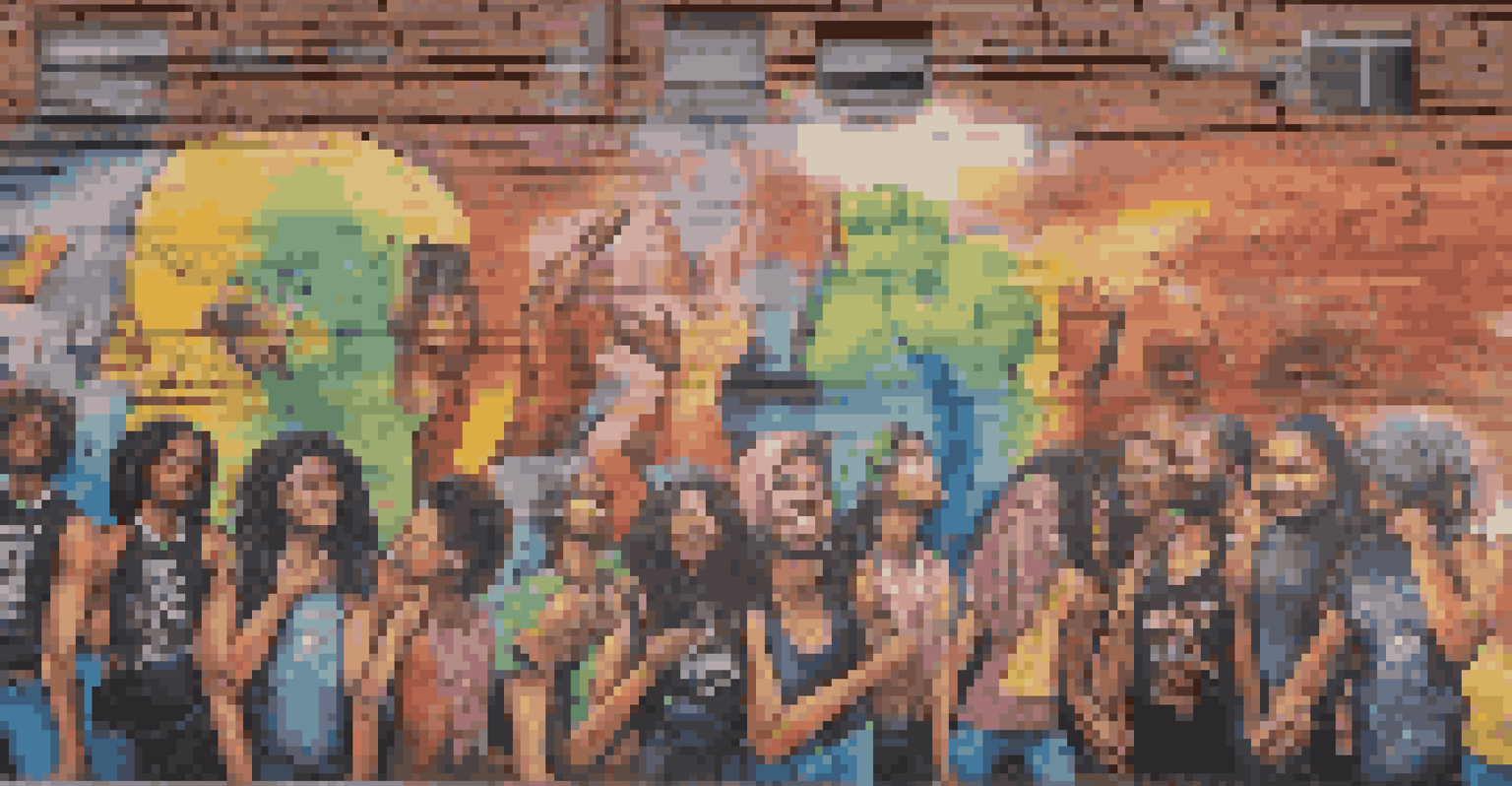The Role of Music in Shaping Youth Activism and Identity

Music as a Catalyst for Social Change Among Youth
Music has always played a pivotal role in social movements, serving as a powerful tool for expression and unity. From the civil rights anthems of the 1960s to contemporary protest songs, music resonates deeply with youth, inspiring them to take action. This connection allows young people to voice their concerns and rally support for various causes, highlighting the importance of music in activism.
Music can change the world because it can change people.
For instance, songs like 'Fight the Power' by Public Enemy have become anthems for movements advocating for racial equality. These tracks not only amplify the message but also create a sense of community among listeners. When youth engage with such music, they feel empowered to join the conversation and contribute to change.
Moreover, music festivals and concerts often serve as platforms for activism, where artists encourage fans to engage with social issues. This fusion of entertainment and advocacy magnifies the impact of music, showing that it can be both enjoyable and instrumental in shaping societal norms.
Creating Identity Through Musical Genres and Communities
Young people often explore their identities through the music they listen to, finding communities that resonate with their values and experiences. Different musical genres, such as punk, hip-hop, and folk, offer unique narratives that can deeply influence a young person's sense of self. This exploration can lead to a more profound understanding of their place in the world and the issues that matter to them.

For example, punk music has historically been associated with rebellion and anti-establishment sentiments, appealing to youth who feel marginalized or misunderstood. By immersing themselves in this genre, young people can express their dissatisfaction and desire for change. This shared experience fosters a strong sense of identity and belonging among fans.
Music Unites Youth for Change
Music serves as a powerful tool for youth to express their concerns and rally support for social causes.
Furthermore, music platforms, like social media, allow youth to connect with others who share similar tastes and beliefs. These connections often extend beyond music, leading to collective action and a stronger commitment to various causes.
The Influence of Lyrics on Youth Perspectives and Actions
Lyrics hold a significant power in shaping youth perspectives, often addressing social issues that resonate with young audiences. When artists tackle themes such as inequality, climate change, or mental health in their songs, they not only raise awareness but also encourage listeners to reflect on their own beliefs. This lyrical engagement can motivate young people to take action, whether through activism or personal transformation.
The power of music makes all the difference in the world.
Take, for instance, Billie Eilish's song 'All the Good Girls Go to Hell,' which addresses climate change and environmental issues. The song's vivid imagery and compelling message inspire listeners to think critically about their role in the world. Such powerful lyrics can spur youth to advocate for change and make informed decisions.
In this way, music becomes a vehicle for education, enabling young people to engage with complex topics in an accessible manner. By connecting emotionally with the content, they are more likely to internalize the messages and act upon them.
The Role of Artists as Activists and Role Models
Many musicians have taken on the role of activists, using their platforms to advocate for social and political change. This visibility is crucial for inspiring youth, as they often look up to artists as role models. When artists speak out on important issues, they not only amplify the message but also encourage their young fans to engage in activism themselves.
For instance, artists like Taylor Swift and Chance the Rapper have actively participated in campaigns advocating for voting rights and social justice. Their involvement highlights the importance of using one's voice to effect change, demonstrating to youth that they too can make a difference.
Artists Inspire Activism
Musicians like Taylor Swift and Chance the Rapper use their platforms to advocate for social justice, motivating young fans to engage in activism.
As these artists lead by example, they help to create a culture where activism is not only accepted but celebrated. This trend fosters a generation of young activists who are empowered to raise their voices and pursue their causes passionately.
Building Community Through Music and Activism
Music has a unique ability to bring people together, creating communities centered around shared passions and causes. For youth, these musical communities can become spaces for collaboration, learning, and activism. By engaging with others who share similar interests, young people can develop a sense of belonging and purpose in their advocacy efforts.
For example, local music scenes often host benefit concerts that raise funds and awareness for various causes. These events not only showcase local talent but also encourage community involvement and solidarity. By participating in such initiatives, youth learn the power of collective action and the impact they can have together.
In addition, online platforms enable young activists to connect with like-minded individuals across the globe. This digital landscape fosters a sense of global community, allowing youth to collaborate on campaigns and share their experiences in real time.
The Intersection of Music, Technology, and Activism
In today’s digital age, technology has transformed the way music is created, shared, and consumed, opening new avenues for activism. Social media platforms, for instance, allow artists to reach a global audience, spreading their messages of change further and faster than ever before. This connectivity empowers youth to engage with music and activism in innovative ways.
Consider how movements like Black Lives Matter have utilized music and technology to amplify their voices. Viral songs and videos on platforms like TikTok have helped to spread awareness and mobilize young people around social justice issues. This intersection of music and technology creates a dynamic environment for activism, making it more accessible to youth.
Technology Amplifies Musical Activism
The rise of social media and streaming services enables artists to share their messages of activism widely, empowering youth to participate in social movements.
Additionally, streaming services have democratized music consumption, allowing emerging artists with activist messages to gain traction. As these artists rise to prominence, they inspire young listeners to reflect on their values and take action, reinforcing the symbiotic relationship between music, technology, and activism.
The Lasting Impact of Music on Future Generations of Activists
The influence of music on youth activism is not just a fleeting trend; it shapes the very fabric of future generations. As young people engage with music that resonates with their beliefs, they are more likely to carry those values into adulthood. This lasting impact ensures that the spirit of activism continues to thrive, driven by the power of music.
Moreover, as artists evolve and new genres emerge, the messages within music will continue to reflect the changing landscape of social issues. Future generations will undoubtedly find inspiration in the music of today, carrying forward its legacy of activism and advocacy.

Ultimately, the role of music in shaping youth identity and activism is profound. As young people find their voices through the melodies and lyrics that speak to them, they become part of a larger narrative of change, ensuring that music remains a vital force for good in the world.